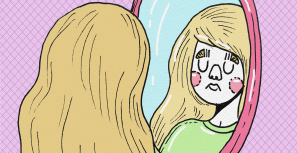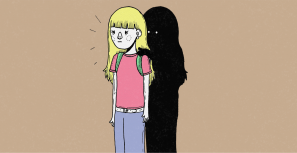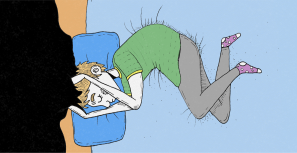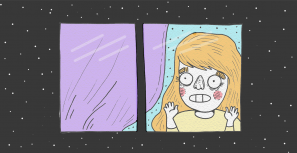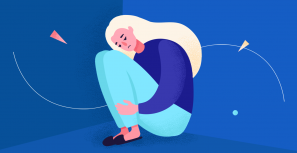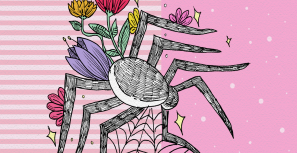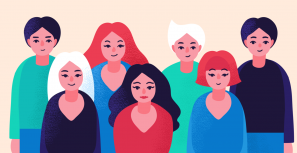“你知道,有时候我在世界上感觉很好,有时候我只是感到如此苦恼,我想用根部拉出头发。”〜Sharon Stone。
For many, there is something natural about feeling like you want to pull all of your hair out when you’re stressed or overwhelmed. But for millions of others, this is more than a feeling – it is a reality.
The condition, known as “trichotillomania,” effects as much as 4% of the population at some point in their life (roughly 280,000,000 people in the world), and is a common and frequent symptom of stress and anxiety. It’s also not well known, and many people struggle with the condition in silence.
什么是三胞嘧喃?
Trichotillomania is the name for the desire or compulsion to pull out your own hair. It is a complicated issue, one that is believed to be directly related to anxiety and stress, but can also run in families and occur for no apparent reason at all.
Those who struggle with trichotillomania often find that they are frequently tugging on their hairs hard enough to pull it out by the root. In some cases, when the trichotillomania is frequent or is concentrated into a single area, it may result in the development of visible bald spots on the scalp.
“Trichotillomania”术语在1800年代被创作。它转化为“疯狂的头发”。
Trichotillomania Symptoms
Most people that struggle with trichotillomania are aware that they have the problem. But many do not realize they’re pulling out their own hair while they’re doing it – only after they have been pulling their hair for a while, or when someone points it out to them.
Trichotillomania的症状是:
- Desire to pull out hair.
- Signs of baldness.
- Broken hairs.
Keep in mind that hair pulling is not limited to the scalp either. Although it is more common to pull hairs on the top of the head, some people pull on their eyebrow hairs, facial hair, chest hair, and underarm hair.
Usually, although not always, the hairs are pulled only one at a time.
脱发可能是永久性的,但通常,如果您学会控制三胞瘤,毛发会增加。然而,由于条件可能会令人尴尬,有些人也争取低自尊,社交恐惧症和其他相关条件。
Trichotillomania Causes – Why Do People Pull Their Hair?
There is evidence that trichotillomania can run in families, meaning that somehow there is a genetic cause. But not everyone with parents who pulled their hair is going to develop the condition. Usually, the development of trichotillomania is brought on by one of the following:
- Anxiety and StressTrichotillomania最常见和最常见的原因是焦虑和压力。但为什么焦虑和压力会导致头发拉动?研究人员并不完全确定。它似乎与其他焦虑相关的蜱相似,就像你的钉子或摇晃你的腿一样。似乎有一些关于人们发现舒缓的头发的冲动。也许头发拉动的轻微疼痛导致在化学水平上发生的某种“良好感觉”。尽管如此,当有人焦虑和压力时,拉头发的冲动似乎更强大。有证据表明它对神经有一种平静的影响。
- 强迫强制Although obsessive compulsive disorder is an anxiety disorder, it deserves its own place as a cause of hair pulling. Obsessive compulsive disorder occurs when someone’s obsessions (chronic thoughts) lead them to developing habits to help them stop those thoughts, known as “compulsions.” Once again, it’s not entirely clear why hair pulling is the habit instead of some other compulsion, but it does appear to be more common in those with OCD.
- Self-HarmThere are some that believe that trichotillomania is a form of self-harm, much like cutting disorders and self-mutilation. This may be true in select cases, but it is likely rare that this is the problem. Although hair pulling can cause momentary instances of pain (which, as in the case of self-harm disorders, some people perform “just so they can feel the rush”), the pain is usually not very pronounced and the link between the two is weak at best. It is possible that some people pull their hair as a form of self-harm, but most instances are going to be related to stress.
有些人也会因为无聊而拉着他们的头发,在那里他们迷失在思想中,他们的手只是不确定要做什么。有趣的是,有证据表明,在焦虑效果的情况下,厌倦了厌倦了令人兴奋的效果。
If it seems as though the cause of trichotillomania is not entirely clear, that’s because it is not. There doesn’t appear to be a specific reason that people choose to pull their hair. But there also isn’t a clear reason that some people bite their nails, and yet millions of people do.
最有可能的是,从我们的日子留下了一个本质的行为。也许早期的男人需要向舒适拔出头发,虽然现代人可以刮胡子并获得理发,但本能是由压力引发的。
No matter the cause, those with trichotillomania generally don’t want to have the habit, but either:
- Feel too much of a desire to do it and give in.
- Don’t realize that they’re pulling their hair while they’re pulling it.
It can eventually develop into a common habit, and once anything becomes a habit it becomes far more difficult to control without help.
Trichotillomania Treatments
Trichotillomania是非常可治身的。虽然有一个小捕获。虽然大多数人不想要头发拉动的后果,例如秃头,但有一种有意识或潜意识的拔出头发的愿望。请记住,强制本身是欲望拔出自己的头发。
Any time a person wants to do something on any level – even a subconscious level – stopping it can be a bit tricky. There will be that part of you that wants to keep plucking away, and this part may be especially problematic when you’re bored, anxious, stressed, or simply not paying attention.
That’s why before you even look at trichotillomania treatments, you’ll need to start with the following:
介意介意is not a cure for trichotillomania, but it does play a role in your ability to treat it. Those that have trichotillomania rarely realize they’re pulling their hair, or at least do not necessarily feel like they can stop and control it. Mindfulness is an important starting point. With mindfulness, you train yourself to be aware of when you’re pulling your hair so that you can make sure you have control over the habit. You can do this by:
- Setting reminders throughout the day to make sure you’re not pulling your hair.
- Asking friends or loved ones to tell you when you’re pulling your hair.
- Immediately controlling your hands and paying attention when you feel stress/anxiety.
基本上介意只是对现在的认识。当你迷失自己的想法或忙于其他事情时,习惯更常见。这就是为什么有三胞嘧啶的人在驾驶时或坐在家里看电视的同时拉扯他们的头发:他们的头脑并不是在他们的手上,他们只是在考虑他们的焦虑。
通过这些普通提醒培训自己更加了解现在和您的行为是避免Trichotillomania的重要一步。
Busy HandsAlso, if your hands aren’t free you cannot pull your hair. A large part of curing trichotillomania is simply breaking the habit. Keeping your hands busy is a great way to start breaking that habit.
But what can you do with your hands?
Some ideas include:
- 全天持有压力球。
- Taking up knitting, drawing, Sudoku, or some type of hand-related hobby.
- Walking, sports, or engaging in some activity that keeps you busy.
If your hands aren’t free to pull your hair, then the habit of pulling your hair cannot take place. Some experts also recommend wearing a hat for a while (if the hair pulling is one your head) so that you’re unable to touch your hair to pull it. This will also help you realize when you’re about to pull your hair – if you reach up and touch your hat, chances are you were going to start hair pulling.
Treatment for Trichotillomania
治疗拔毛发癖是一种更惠icated. Interestingly, the two starter strategies discussed above are commonly used together in the treatment for trichotillomania as well, within a type of therapy called “Mindfulness-Based Cognitive Behavioral Therapy.”
In this therapy, the client is thought how to control their thoughts and behaviors using cognitive behavioral therapy techniques, which include things like learning how you respond to stress and anxiety, being able to separate your thoughts from your sense of self, and replacing the behavior.
In addition, the most successful way to stop trichotillomania is to control your stress and anxiety. If you don’t feel anxious, and you are able to cope with stress, you are less likely to experience symptoms.
However, there are some strategies you can try to do at home. In addition to mindfulness and keeping your hands busy, you can also try:
- 习惯更换与忙碌和忙碌的手有关,是用更加成熟的习惯取代习惯的想法。如果您注意到您即将拉头发,请考虑用新的习惯取代它,如捕捉手指或敲击膝盖。您应该始终优先考虑降低压力和焦虑,但像膝盖上的攻丝一样,习惯不太可能影响你的自我痛苦而不是拉出头发。习惯逆转是长期三胞嘧啶治疗的重要工具。
- 放松培训此外,一旦你的状况良好,下一步就是教自己放松。与习惯更换类似,想法是你从事有效的东西而不是拉头发。如果你发现你担心,你拉着你的头发,你可以尝试放松策略,如深呼吸和进步肌肉放松,让自己降低自己并重新获得控制你的行为的能力。
- 阅读这篇文章不,不是。但专家发现,那些花时间定期阅读更多关于三胞嘧啶和焦虑的人更能够防止它。这很可能是因为心灵的理解条件越多,你就越有可能意识到强迫即将发生,以及能够提醒自己不要拉扯。在某种程度上,只需阅读这篇文章就是一个很好的启动方式。
Boredom-based trichotillomania also has a simple cure – find ways to be less bored. You can also try to engage in more physical activities, which tire the body and make it less prone to boredom behaviors.
Similarly, anxiety based trichotillomania does require that you learn how to control and regulate your anxiety better, because as long as stress continues to affect you unimpeded, you may continue to find that your hands have the urge to start pulling. But if you can cure your anxiety, so too would you prevent this stress hair pulling habit.
治疗三胞嘧啶是可能的,不仅仅是可能的
There is considerable good news: trichotillomania is highly treatable for those that want to treat it. For many, the reason it becomes such a significant problem is because it can take months or years for someone to seek out help. Once you start focusing on reducing and curing the condition, you’ll find that you are in much more control over when it occurs.
Recurrence IS an issue, however, because any habit that is triggered by stress and anxiety runs the risk of coming back when you’re under future stress. That is why controlling your anxiety is always going to be a critical part of any trichotillomania treatment plan.

